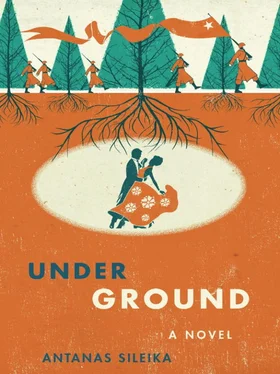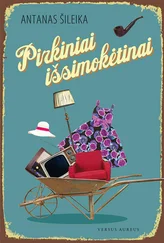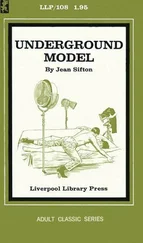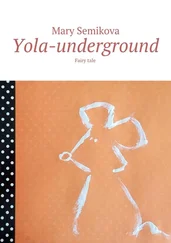“Do you want me to say again that I love you?”
“Yes, of course I want you to say that. The words are very sweet to my ears and I never tire of hearing them. We’re living in an ocean of lies and melancholy, and sometimes I think I can’t bear it anymore. I have to have hope of some kind. I’ll do this thing if you want me to, and I’ll do it for you because you love me, and only for that reason.”
“I do love you.”
She took his hands in hers and examined his fingers, now just as red as hers. She shook her head and laughed a little, and then pulled him forward, kissing across the table.
LATE SUMMER, 1946
PETRAS was an alcoholic forger who had stumbled into Flint’s realm and now chafed under the restrictions of the teetotalling partisan leader.
“No liquor, no work,” said Petras, crossing his arms and looking to his wife, who sat pale and trembling at the kitchen table of the American farmer. To the unease of the American, the partisans used his house more and more often for rendezvous. He wished he could send his children somewhere, but there was nowhere to send them. Thus he became the ambivalent host to partisan meetings and a post office for underground messages.
The forger’s greasy black hair had several cowlicks at the ears and the crown, and his suit, tie and collar were both dirty and badly mended. Lukas wondered how such a man, such a couple, ever came to exist. The war gave birth to unlikely pairings: Petras was a country teacher on his way down whereas his wife had been a village slattern who was improving herself with him until the liquor took the upper hand.
Flint stood over the couple at the long wooden table, with Lukas and the American by the door and Lakstingala outside, watching out for Reds.
Petras and his wife were now itinerant forgers, who travelled from village to village creating false documents for payment of samagonas, the home-distilled liquor that every farmer made from whatever was at hand. Petras could re-create official-looking imprints of government stamps out of wood blocks, and his wife had a large collection of blank government forms and suitable paper, as well as the punch used to attach and seal photos to passports, travel documents and military exemptions.
As far as Lukas could see, the man and his wife never ate, but never looked drunk either. Their skill was marvellous, but when they made their way into Flint’s realm, he forbade their travelling any farther and kept them under his control. A forger was useful, but a drunken one was dangerous. Sooner or later he would be caught by the Cheka and tell everything he had done for a glass of vodka. Flint kept him at various safe farmhouses and tried to wean him off alcohol. None of the partisans was permitted to drink, and Flint hated to make an exception for the forger.
“The alcohol will kill you both,” said Flint. “I’m doing you a favour.”
“And how do you expect us to work?” asked Petras. “Look at my wife. She’s trembling so much it would be a waste of paper to have her touch anything. And I’m not much better.”
“These are petty, personal problems,” said Flint. “We’re at war.”
“If you have a sliver under your fingernail, it hurts whether you’re at war or not. If you’re starving, you can’t fight.”
“Alcohol is not food.”
“It is to us. You’re starving us to death. Every animal has its own needs. The fox wants flesh and the crow wants grain. Only the pig will eat anything, and we’re not pigs.”
Flint hated to forgo his principles. His principles had brought him into the forest. His principles had kept him there for two years while dozens of his best men died in battle, or were taken prisoner, or blew themselves up to avoid capture.
“One small glass each,” said Flint, tapping his pipe on the table to underline his concession.
“One large glass before and one large glass after,” said Petras, and so their haggling began, resulting, after much bickering, in medium glasses before and after the job.
Flint put his pipe in his mouth and lit it. He looked at Lukas through the pipe smoke with a hint of accusation. So much trouble just to get the forger to make a top-quality pass for Lukas’s personal trip. Although Flint had promised the trip to Lukas, he was not happy about it.
Flint was grudging about giving leaves to his men. Partisans went off on private business and never came back. They stopped for a drink at a former neighbour’s house and drank themselves into a stupor, and then wandered the streets until a group of slayers took them down. They went to attend family weddings and exposed themselves to the whole neighbourhood, and were followed back to their bunkers by spies. Time wore the men down, and some betrayed their former comrades for the promise of a soft bed.
But Lukas was something of a special case, and for him Flint was prepared to make an exception. Like Lozorius in the past, Lukas had developed a reputation. He shot dead a roomful of Reds in Marijampole with the help of his fiancée. He was good for the morale of the people, whose only real news came through whispers and the underground newspapers, and whose news was almost invariably bad. A man with a reputation could be given a little leeway.
And finally there was the matter of Lukas’s growing signs of distraction. He had fallen irredeemably in love with Elena, from whom he had been separated to keep each of them safe. Flint had managed to keep them apart for four months, hoping Lukas’s feelings would cool, but his ardour hadn’t cooled at all.
On the night of the engagement party the previous April, Flint was waiting for them with the sleigh as planned.
“How many dead?” he asked as soon as they stepped into the sleigh and the driver cracked the whip at the pair of horses.
“Five dead and one wounded.”
“You let him get away?”
“The accordionist.”
“You should have killed him too. Now the Chekists will be on our tails very fast.”
Elena and Lukas had melted into one another under the woollen blankets, but they came alive again when the sleigh met another one a few kilometres away at a crossroads.
“Lukas, into the other sleigh,” Flint had ordered.
Elena shot up. “Where are you taking him?”
“I’m separating you for your own good. The pair of you will be a prize the Reds hunt hard.”
“I want to go with him,” said Elena.
“You’ll do as I say.”
“No. You made a promise. I did this to help you and to be with Lukas. You’re breaking your side of the bargain. Do that and I quit you right now.”
“You cannot quit the partisans. There is no quitting once you’re in.”
“Then shoot me dead right here. I refuse to be separated.”
“Lukas,” said Flint, “tell her I’m right.”
“I won’t do any such thing. You promised.”
“Yes, I did. But not to let you stay together right away. We need to disperse for a little while.”
“How long?” asked Elena.
“A few weeks at most. Now, come on.”
“Wait,” said Elena. She took Lukas by the hands. “Do you promise to come back for me?”
“I will. As soon as I can.”
“Don’t die. Be very careful not to get yourself killed or captured, if only for my sake. You owe me that.”
He kissed her, and then stepped into the other sleigh and sped down a branching road.
It had taken longer than a few weeks, but now he was going for her.
After drinking their glasses of samagonas, Petras and his wife regained their colour and set to business, laying out their stamps, inks, pens and papers. Lukas went out to join Lakstingala on sentry duty, finding him seated near the barn with his back against a haystack. Like a sailor, Lakstingala wore his stocking cap in all weather, even the summer heat. He was a comforting man to sit beside because, although he was compact, he seemed to contain great strength, a reserve of potential energy that he could harness if he needed to.
Читать дальше












